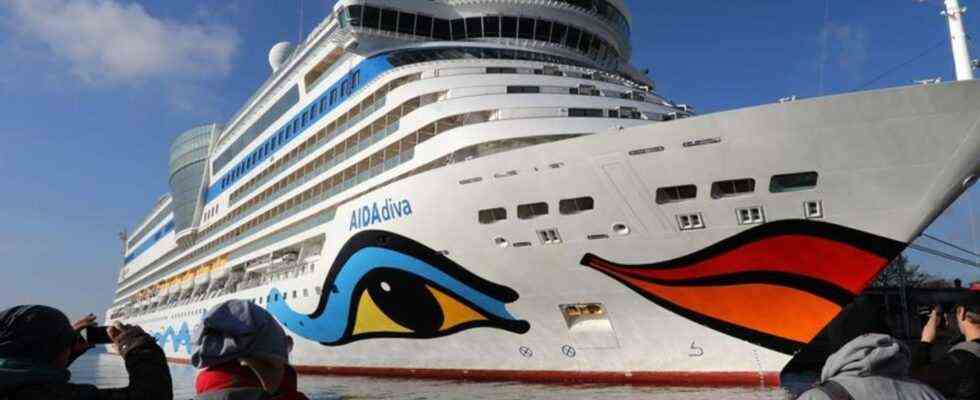shipping
The principle of hope: cruise operators rely on normality
The “AIDAdiva” has moored in Warnemünde. Photo: Bernd Wüstneck / dpa-Zentralbild / dpa
© dpa-infocom GmbH
After the Corona emergency braking in 2020, the cruise industry caught up a little in 2021. The return to old strength is set to continue in 2022 – if Omikron doesn’t throw a spanner in the works.
At the beginning of the third year of the pandemic, the cruise operators do not want to give up their newfound optimism right away.
The industry, which was once used to success, plans for 2022 with the hope that the corona situation will ease over the course of the year. A gradual return to the business of earlier boom years is unlikely to be an issue again until 2023 at the earliest. Because the unprecedented rate of spread of the new Corona variant Omikron makes practically all areas of life unpredictable again – and has already slowed down one or the other cruise at the turn of the year.
Concrete figures on the booking behavior of cruise fans cannot be elicited from the providers. Tui Cruises, a joint venture of the world’s largest travel company Tui and the cruise company Royal Caribbean, speaks of a positive advance booking situation for the 2022/23 season, but also notes, “due to the current situation, our guests tend to book at short notice for the current winter season”. At the moment, Tui is on the move with five out of seven ships in the “Mein Schiff” fleet and is gradually aiming for regular capacity utilization in the course of 2022.
Trend towards last minute
MSC Cruises also reports uncertainty among customers and a sustained trend towards last-minute bookings, but wants to have the entire fleet of 19 ships at sea again in summer 2022. Like the competition, the shipping company tries to lure guests back with flexible booking conditions – and to keep them going. This includes generous conditions for free rebooking to later travel dates or early bird discounts as well as “on-board credit”, such as those offered by Aida Cruises for early new bookings after travel cancellations. The daughter of the cruise giant Carnival is currently on the move with 10 of 13 ships that are still operating with an “adjusted passenger capacity”. In other words: There are not nearly as many people on board as would be possible.
The company’s programs read like timetables in normality – and contain all of the classic destinations such as Norway’s fjords, the Baltic Sea and the warmer climes of the Mediterranean and the Canary Islands. The cruise season in German ports will also start much earlier than in summer 2021: According to current planning, Aida will start on April 11 at Warnemünde and a little later MSC, in addition to Hamburg, also from Warnemünde. More cruises are also to start from Bremerhaven, for example from Tui and Aida sister Costa Crociere, which also wants to return to Kiel.
Omikron slows you down
Recent examples show how quickly plans can become waste. This week MSC had to suspend departures of the “MSC Magnifica” until mid-January, which heads for European metropolises on winter trips from Hamburg. The reason for the cancellation was the lockdown in the Netherlands and sharp Omikron measures in Great Britain, which exclude EU guests from going ashore. And because of several corona cases on board the “Mein Schiff 4”, passengers had to end their trip on Gran Canaria prematurely. All 1,600 passengers disembarked there on Sunday, although around 300 of them were supposed to spend seven days on the ship.
Because of the difficult to predict development, the Federal Foreign Office has been advising against taking part in cruises since mid-November. The reason from Berlin: “There is a risk that in the event of a Covid-19 outbreak on board – even among vaccinated travelers – the responsible authorities abroad will impose a ship quarantine for several days. A prompt return transport to Germany would be excluded. ” The only exceptions to the warning are cruises on “ships with specific hygiene concepts whose voyage begins in a port in Germany and ends again in a port in Germany without docking in a foreign port”. Such trips are the exception in the cold season.
“The travel warning does not of course have a sales-promoting effect on the industry,” says MSC diplomatically. On the other hand, it does not deter “enlightened” customers. Other shipping companies do not want to comment on this at all – and refer to their hygiene concepts, which have been in force since 2020 and are constantly being adapted, which, according to unanimous industry statements, have prevented major corona outbreaks on board cruise ships across the board. This includes close-knit tests, fixed protocols for isolating infected passengers, distance rules and – depending on the destination countries – increasingly 2G or even 1G or 1G-plus rules. That means: only vaccinated and convalescent or only vaccinated people come on board. In some cases, a test certificate is also required.

